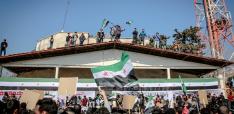European War and Global Pandemic: The Renewed Validity of Active Non-Alignment

The war in Ukraine is a turning point in the international relations of the Twenty-first century. As the bloodiest confrontation in Europe since World War II and with no end in sight, it has brought back the horrors of war to a continent that many thought had left them behind.
.jpg) The Russian invasion of Ukraine, in violation of international law and of basic principles such as ‘respect for national sovereignty’ enshrined in the UN Charter, and due to the humanitarian suffering that it has brought, has been widely condemned by vast sectors of the international community. It has generated a strong consensus within NATO and the G7 countries, putting an end to the divisions in the transatlantic Alliance during the administration of Donald Trump. This has led to large flows of direct and indirect military and economic aid to Ukraine, which has enabled Kiev to resist the Russian offensive during the first year of the conflict.
The Russian invasion of Ukraine, in violation of international law and of basic principles such as ‘respect for national sovereignty’ enshrined in the UN Charter, and due to the humanitarian suffering that it has brought, has been widely condemned by vast sectors of the international community. It has generated a strong consensus within NATO and the G7 countries, putting an end to the divisions in the transatlantic Alliance during the administration of Donald Trump. This has led to large flows of direct and indirect military and economic aid to Ukraine, which has enabled Kiev to resist the Russian offensive during the first year of the conflict.
President Joseph Biden has argued that the war in Ukraine expresses what would be the main cleavage in the international system, the one between democracies and autocracies, something that has been echoed in several European countries (Youngs, 2022). Given the long tradition of commitment to international law and the principles of ‘national sovereignty’ as well as ‘non-intervention’ existing in Latin America, a region with an overwhelming majority of democratic regimes, one would have expected a reaction similar to Europe, the United States, Canada, and Australia. However, this has not been the case.
Although no Latin American countries voted against the resolution (four of them, Bolivia, Cuba, El Salvador and Nicaragua abstained, and Venezuela was not present) condemning the Russian invasion in the UN General Assembly on 2 March 2022, nine of them abstained and three voted against a subsequent resolution to suspend Russia from the Human Rights Council. No country in Latin America has supported the diplomatic and economic sanctions on Russia promoted by the United States and the European Union. The presidents of the two largest South American countries – Argentina and Brazil – paid state visits to Moscow shortly before the Ukraine invasion, with Brazilian President Jair Bolsonaro saying he was doing so “in solidarity with Russia”. The president of Mexico, Andrés Manuel López Obrador, has also expressed his neutrality in the conflict.
What explains this apparently counterintuitive behavior of some of the main Latin American countries in the face of a conflict of this type, a true watershed in international affairs? How does the preference for non-alignment expressed by the Latin American countries compare to nations in other regions of the South? What new trends and key patterns do we observe in terms of the foreign policy and diplomatic positioning of these countries in the Global South, and what are the implications for international governance?
To read the full Essay please click here.
Carlos Fortin is an emeritus fellow at the Institute of Development Studies (IDS), University of Sussex; Jorge Heine is a research professor at the Frederick S. Pardee School of Global Studies, Boston University; Carlos Ominami is a director of the Chile 21 Foundation and a former minister of Economic Affairs of Chile. Their edited book, Latin American Foreign Policies in the New World Order: The Active Non-Alignment Option, will be published by Anthem Press in February 2023.
This essay is part of The Emerging Global Governance (EGG) Project; a collaborative research initiative led by Gregory Chin at York University (Canada) and Eva-Maria Nag at Global Policy journal, Durham University.


